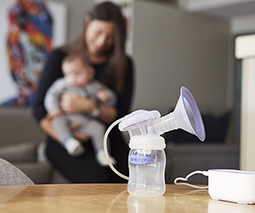Breastfeeding rights at work: Here is what you need to know before you start

Returning to work after having a baby isn’t always easy. Not only do you need to wrestle yourself away from your baby (and make your peace with whatever childcare option you’ve chosen), but you also need to take into account how you will continue to breastfeed your baby when you’re away from them for a large part of the day.
Unless you have a super supportive workplace, this is where things can get tricky for mums returning to work after having a baby – and who want to be able to continue giving their babies breastmilk. If you plan to express milk while you’re at work, you’ll need to discuss with your boss a suitable place to set yourself up – and get their support to take regular lactation breaks to pump your milk.
Having these conversations with your boss might not be easy – so it pays to know what your rights are so you can go in confident and informed. Remember, your employer might not know the legislation around supporting breastfeeding mums, so it’s up to you to tell them.
Here is what you (and your employer) needs to know about your breastfeeding rights at work:
It’s your legal right
You are legally entitled to combine breastfeeding and paid work – and anyone who discriminates against you as a breastfeeding mum is breaking the law. This means that unless they can prove that your requests are unreasonable, it is against the law to refuse to support you to breastfeed or express your milk in the work place.

You need to start the talking
It’s up to you to present your needs to your employer and explain what arrangements need to be made in order to support you to breastfeed your baby or express your milk at work. Your employer should then make the necessary arrangements to support you – for example, by finding you a private and safe area to pump your milk, where you won’t be interrupted.
Lactation breaks
You should be allowed to organise work breaks in order to express your milk, as long as your requests are reasonable, according to your employer and the organisational needs of your workplace. Unfortunately, there is no legislation that states these breaks must be paid. When it comes to lactation breaks, you should discuss your needs directly with your employer to come up with a mutually beneficial arrangement.

Breastfeeding at work
If you would like to have your baby brought into work so you can breastfeed, you should address this idea with your boss. However, there is no legislation supporting babies in the workplace as this will really depend on the nature of the work and how the entire workplace will be impacted. Again, discuss with your boss what you would like to have happen, and how you plan to make it work. If you’re able to convey that feeding your baby at work is quicker and better for productivity, then he or she may see your point. It’s worth putting it out there.
Work shifts
Your employer cannot insist that you work nightshifts when other shifts are available that would be more supportive of breastfeeding. Additionally, if your employer insists that you wean your baby before you return to work, this may be discrimination, because it is against the law to refuse to make appropriate arrangements for a breastfeeding mother to continue this at work.
Get onto it early
Hopefully, your employer will be prepared to listen to what you need in the workplace, and make the necessary arrangements that can support your breastfeeding. If you’re unsure, the best thing to do is organise a meeting prior to your return to work, where you can discuss what you need and listen to your employer’s take on things. Going in prepared will help you stand your ground and put your needs across fairly – but firmly.
Fingers crossed, you have the type of boss that gets how awesome it is to be able to feed you baby with your own body – and they’ll bend over backwards to help you keep doing it. Not only will this make your return to work so much easier, but it will set an amazing precedent for everyone in the company.









